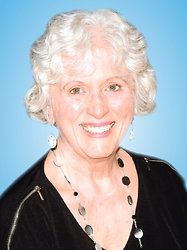I gave my high school graduation speech on the serenity prayer. At that point in my life, it was the courage to change part that stood out and caught my imagination. I suppose most of us at the ripe old age of 17 or 18 are on fire with the conviction that we can make a difference in the world, that we can change what needs to be changed, not to mention our belief that we are the perfect one to do it.

On top of this conviction, my personality type lives to both self improve and help others to do the same. This characteristic led me to have a hard time throughout much of my life in dealing with the second part of the serenity prayer, accept what cannot be changed. Cannot be changed? Cannot? It was a foreign concept.
My basic belief system told me that anything is possible. In fact, it still tells me that. I've been the recipient of enough miracles to 'keep the faith.' What remained hidden to me lo those many years is that, while anything is possible for any given soul to accomplish in his or her own life, it is impossible to force anyone else to change anything that he or she does not wish to change. Here's where the accept what cannot be changed part comes in.
Teens who cannot believe that their parents are simply the only parents in the universe who do not allow them complete freedom often come up against that immovable force that proves time and again that they cannot force their parents into becoming more permissible. The less fortunate are able to wear their parents down and, therefore, put off learning this all important lesson until a later date. The lesson will come, it's just a matter of when and after how much suffering.
Spouses and others in an alcoholic relationship who haven't learned to accept what they cannot change, namely the alcoholic's propensity to drink, will eventually need rehabilitation themselves to recover from their obsession for 'saving' the loved one. And how many parents continue to support children who won't, not can't, see to their own needs?
Eventually, both parent and child lead miserable lives, each unwilling to see to their own lives and accept what they are powerless to change in any other human being. The sad fact is that their very behavior often enables the continuation of the problem.
Both you and I could list many other situations where we have found ourselves and others suffering needlessly, putting ever increasing effort into trying to change a loved one, a student, an employee, a derelict, whomever! What we really need, we eventually discover (if we are fortunate), is to order our own lives as ethically as we can, having compassion, understanding, and acceptance for other human beings who wage their own struggles day in and day out.
The wonderful news is that we are free to change what can be changed - ourselves - in any way we like. We can decide to remain in a relationship with an ungrateful child, an alcoholic spouse, an unappreciative boss, a nosy neighbor, whomever, even when we see obvious need for changes in that person. Or we can change our own behavior.
A parent need not support a lazy or an addicted adult child. A husband need not remain married to a wife who is unfaithful, a friend can distance herself from a friend who uses her, a do-gooder can stop lecturing her alcoholic neighbor.
There is, of course, genuine help that can be offered to another person, be he spouse or stranger, who needs and wants our help. This is a noble endeavor. Let us all resolve to be willing to help our fellow sufferer. There is no higher calling than to willingly share ourselves and our resources with someone who will truly benefit from our assistance.
The question is, however, how do we know what we can change and what we cannot change? That is where our petition for the wisdom to know one from the other comes in. When we get that, we have serenity.
It took me so very many years to know what serenity is all about. I've been striving for it for more than a decade. Last year a friend wrote to me, commenting on my serenity. It came as a shock to me, and a thrill. I have experienced, I realized with joy, true serenity at last. I don't have it all the time, or in every situation. But I now know what it feels like and it encourages me more than ever to continue to offer up the petition that I thought I understood decades ago. I often wonder how much more there is in this simple prayer that I have yet to discover.
Jean Loxley-Barnard has been a writer all her life and studied both sociology and psychology at George Washington University where she earned a B.A. Her company, The Shopper, Inc., encompasses all the Loxley-Barnard family publications - The Shopper Magazines and Doctor to Doctor Magazine. She has been in the advertising, consulting and publishing business for 39 years.
